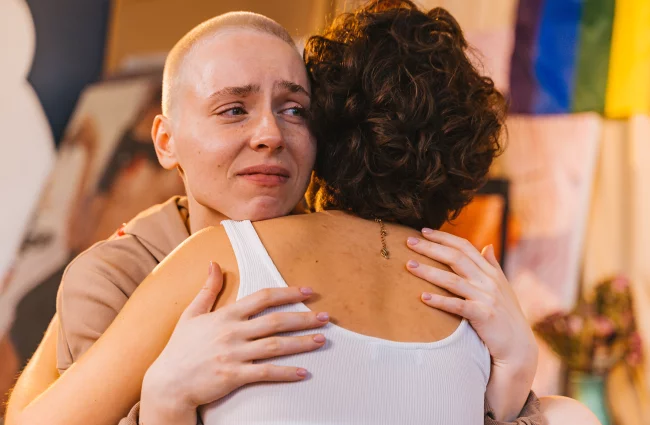All around you, you hear the words “true love” and “soul mate” thrown around. There’s a common belief that you can only be truly happy if you find the right person to complete you, that love is a powerful drug you can’t escape. But is an intense, all-consuming relationship truly love or is it something else? You may have heard the word codependency but don’t know what it means. How can you tell if your relationship is healthy or you’ve got what is sometimes called love addiction?
In this article, we discuss:
- What Is Love Addiction?
- Is Love Addiction a Mental Illness?
- Stages of Love Addiction
- Love Addiction Can Be Destructive
- What is Codependency?
- What is the root cause of codependency?
- Key Differences Between Love and Codependency
- Strategies to Overcome Codependency
What Is Love Addiction?
Love addiction or pathological love is a behavioral pattern that is characterized by an excessive or maladaptive interest in one or more romantic partners, which leads to a lack of control, giving up one’s interests, and other negative consequences. This type of addiction to love is often seen as an immature form of love, as it tends to blind and beyond one’s control, affecting other areas of one’s life.
The prevalence of this type of love is estimated to be 3-10%, with higher rates observed in specific populations like college students (estimated to be 25%). Love addiction is not the same as other disorders, such as dependent personality disorder and borderline personality disorder, as dysfunctional behaviors witnessed in these result from factors other than romantic love.
People with love addiction or love addicts may engage in people-pleasing behavior, put the other person’s needs before their own, and demonstrate unhealthy behaviors that lead to relationship problems like incessant arguments and fights over trivial things, and sometimes to even serious consequences like break-ups, divorce, and affairs. The emotional see-saw can result in one or both partners feeling emotionally and mentally drained as everything is felt and experienced intensely, including passion and pain.
Emotional distress and constant disappointment can cause strain in the relationship, leading to a feeling of resentment until nothing is felt anymore, and the relationship completely falls apart.
Is Love Addiction a Mental Illness?
Although love addiction may not be considered a mental illness as the Diagnostic and Statistical Manual of Mental Disorders doesn’t classify it as such yet, scientific research has indicated that problematic feelings about love can have an effect on the brain that is similar to the negative feelings experienced as a result of substance use disorder (SUD).
A 2016 study compared brain scans of individuals with drug addictions to those with love addictions. The study found that both forms of addictions activated similar areas of the brain’s reward system, especially those areas that have a high amount of dopamine. This suggests that SUDs and behavioral addictions, like love addiction or internet addiction, affect the brain’s activity in much the same way.
Stages of Love Addiction
The early stage of love addiction is very similar to any romantic relationship, but there is an unusual amount of attention on the partner and a burning desire to please him or her. This gradually progresses into an obsession where the codependent person begins to rationalize problematic behavior in their partner. Healthy boundaries begin to get blurred. The codependent person may withdraw from friends and give up previously enjoyed activities to focus on their partner.
The middle stage of codependency is characterized by increasing efforts to overlook problematic aspects of the relationship. There are growing feelings of anxiety, self-blame, and guilt in the codependent person. Self-esteem starts to plummet, and the person begins making compromises to maintain the relationship. All this while, resentment, anger, and disappointment grow as the love-addicted person tries to (unsuccessfully) change their partner with manipulation, nagging, and blaming. During this stage, a codependent person may use addictive substances or behaviors to cope.
In the late stage of codependency, the emotions begin to take a toll on physical health. Codependent people can suffer from a variety of stress-related disorders, such as headaches, sleep problems, digestive issues, eating disorders, sciatica, allergies, and TMJ. Addictions and obsessive-compulsive behaviors take a stronger hold. Feelings of anger, despair, and hopelessness grow.
Love Addiction Can Be Destructive
You might argue that a certain amount of codependency is healthy. After all, isn’t being in love all about putting your partner first? And isn’t the whole point of being in a relationship knowing you have someone by your side? So what if you’re not completely independent anymore?
The destructiveness of love addiction begins when there are elements of a lack of self-esteem and fear of rejection. In a healthy relationship, there is self-assurance and trust. You revel in your partner’s love, but there is not a need to feel accepted or loved all the time.
It’s important to note that relationships are not black and white. People in codependent relationships do experience some benefits, but these benefits are usually short-lived and overtaken by feelings of insecurity.
What is Codependency?
The Diagnostic and Statistical Manual of Mental Disorders (DSM) is an authoritative guide that healthcare professionals use to diagnose mental illness. However, the DSM does not recognize codependency as a distinct personality disorder. The term codependency originated from drug and alcohol addiction, and it has various, sometimes vague definitions.
The simplest explanation is that codependency is seeking love based on feelings of insecurity or inadequacy. A codependent person looks to their partner to repair their self-esteem, alleviate their pain, and complete their inner emptiness. What ends up happening is that the partner cannot be the person they are. Instead, they are forced to fulfill a role the codependent person has chosen for them, i.e., to provide unconditional love and security. Yet, there is never enough love. The codependent person keeps working to try and please their partner to ensure they get the love they crave. It becomes a self-perpetuating habit with obsessive thoughts and compulsive behaviors. That’s why codependency is also sometimes called relationship addiction or love addiction.
What is the Root Cause of Codependency?
Codependency is a maladaptive behavior that stems from a poor self-concept developed during childhood and which continues into adulthood. Negative beliefs about oneself reside in the subconscious and influence one’s thoughts, emotions, and behaviors. These beliefs may be unrecognized, but they shape one’s decision-making and perception of the world.
Do you have a loved one struggling with addiction?
We know how hard that can be. Give us a call to find out what options you have.
People who have toxic codependent tendencies will commonly exhibit an insecure attachment style formed in infancy, and it plays into how they engage with their partners in romantic relationships. Four attachment styles exist, namely secure, anxious-preoccupied, dismissive-avoidant, and fearful-avoidant, and people with codependency issues often have the latter three in them.
Codependency can also be learned during the formative years by being around parents or caregivers who display signs of codependency, which renders kids and adolescents predisposed to developing codependency themselves. Family enmeshment, where personal boundaries are lacking, can also contribute to codependency by restricting individuals from being themselves or inhibiting them from being assertive and expressing their needs and feelings. Enmeshment leads to emotional dependence, which means children will lack their differentiation and won’t be able to recognize themselves as individuals separate from their parents.
In sum, codependency manifests as a complex interplay of multiple factors, such as early experiences, attachment styles, and family dynamics, which not only impacts individuals’ sense of self but also hinders their optimal personal growth. And when these individuals fall in love with someone, they become addicted to love and dependent on their partners for their happiness.
Key Differences Between Love and Codependency
How can you tell the difference between healthy love and codependency? Most people experience a surge of emotions when they first fall in love with someone. However, in healthy relationships, this initial euphoria settles down into more of calm content.
With love addiction, the relationship is rooted in feelings of insecurity and low self-esteem. The result is that a codependent person loses a sense of themselves and focuses completely on the needs of their partner.
Strategies to Overcome Codependency
If you suspect you are in a codependent relationship, there are steps you can take to break the unhealthy cycle.
Don’t be a people pleaser. Understand that you cannot please everyone all the time. It’s okay for your partner to be disappointed or upset with you occasionally. Don’t feel guilty if you can’t always be there for your loved one. Put yourself first sometimes.
Own your happiness. Your happiness shouldn’t depend on whether your partner is happy or not. Arguments are healthy in a relationship. When you disagree, walk away first. Let the dust settle and then discuss the problem rationally.
Love yourself first. The biggest issue with codependency is focusing too much on your partner. Yet, you cannot be a good partner to your loved one if you don’t love yourself first. Spend time with family and friends, adopt a hobby, embrace yourself. Don’t make your partner the center of your universe.
Beware of abusive behavior. People with love addiction often put up with all kinds of unhealthy behaviors, such as cheating or physical or verbal abuse by their partner. Codependent individuals convince themselves they can change their partner. It’s important to know you can walk away or get support if you are in an abusive relationship.
Get professional help. A therapist can help you understand your relationship and navigate your way out of codependency. There is no shame in seeking help. Don’t let a real or perceived stigma against therapy destroy your relationship.
Codependency is not true love. It is a love addiction that can destroy your relationship and destroy you as a person. By becoming aware of the pitfalls of codependency, you’ve already taken the first step towards a healthy relationship with your partner. Now all you have to do is get the help you need if you recognize love addiction in your relationship.
The Bottom Line
A healthy love relationship cannot be based on unhealthy relationship dynamics. Knowing the difference between love and codependency is essential to creating and sustaining genuine connections.
While love addiction stems from negative self-beliefs that form due to childhood trauma and low self-worth, codependency can come from a lack of external validation and fear of being alone. Both scenarios are far from normal, as excessive focus on the partner and compromised self-care can be detrimental to one’s own emotional and mental well-being.
To overcome codependency, you must end the love addiction. Reach out to a mental health professional who can guide you through the process of breaking free from the cycle of indulging in people-pleasing behavior and prioritizing other people’s needs over your own needs and offer you additional resources like therapy and support groups to access judgment-free environment.
Practicing self-awareness, self-love, and mindfulness is key. You can start by setting boundaries and acknowledging your thoughts and behavioral patterns. This will empower you to change your codependent patterns. Other techniques like cognitive behavioral therapy and repeating affirmations can further help change ineffective behavioral patterns and steer away from codependency. Remember, being codependent on your partner does not equate to love. Taking proactive steps to address codependent behavior is necessary to truly love and be loved.




